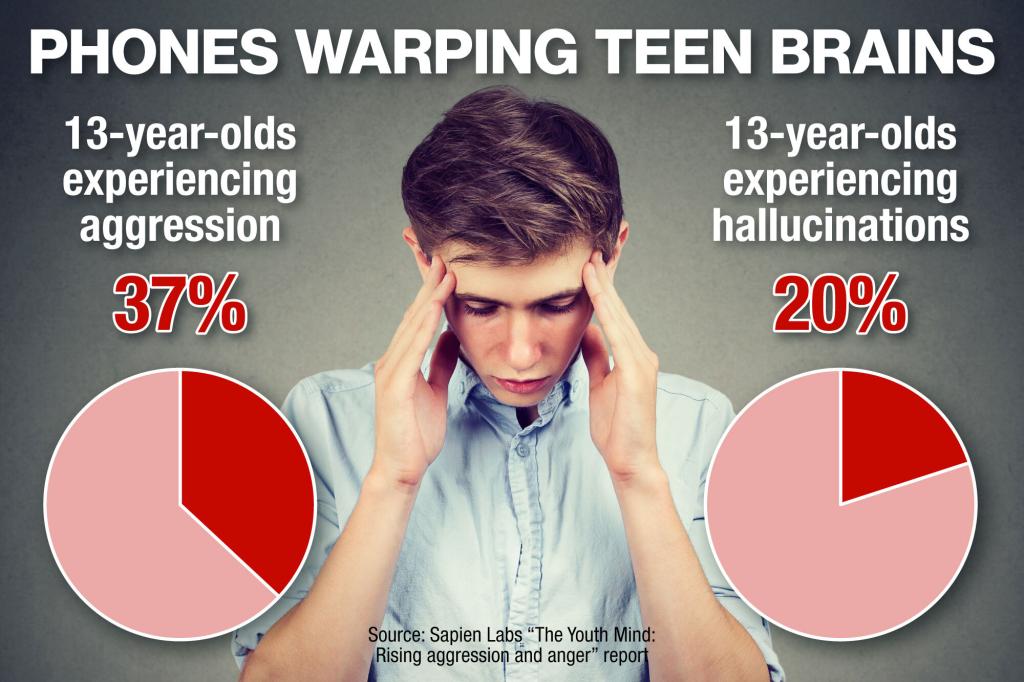The Alarming Impact of Smartphones on Adolescent Mental Health
A recent study conducted by Sapien Labs has revealed a disconcerting correlation between smartphone use and a range of psychological issues in teenagers. The study, which surveyed over 10,500 teenagers aged 13 to 17 in the US and India, found a strong link between the age at which a young person begins using a smartphone and the likelihood of experiencing mental health challenges. The younger the initiation into the digital world, the greater the risk of developing problems such as aggression, anger, hallucinations, and a detachment from reality. These findings paint a bleak picture of the potential consequences of pervasive smartphone use among today’s youth.
The study’s findings indicate a worrying trend of worsening mental health among younger adolescents. Compared to older Gen Z individuals, the surveyed teens exhibited significantly higher rates of psychological distress. Alarmingly, the youngest participants, the 13-year-olds, reported the highest incidence of aggression and hallucinations. This age group also represents the cohort that, on average, acquired their first smartphones at the youngest age – around 10 years old. This suggests a strong association between early smartphone adoption and the development of these debilitating symptoms.
The researchers observed a marked increase in aggressive behaviors among the teenage participants. A significant 37% of 13-year-olds reported experiencing aggression, compared to 27% of 17-year-olds. The prevalence of hallucinations was equally concerning, with 20% of 13-year-olds reporting such experiences, compared to 12% of 17-year-olds. These figures highlight the potential for early and intensive smartphone use to disrupt healthy cognitive and emotional development. Experts suggest that the hyper-stimulating nature of digital content can blur the lines between reality and virtuality, contributing to these hallucinatory experiences.
Beyond aggression and hallucinations, the study also uncovered a high prevalence of other mental health issues among the participants. A significant proportion of teenagers reported experiencing suicidal thoughts, feelings of hopelessness, guilt, anxiety, and unwanted strange thoughts. More than 40% reported a sense of detachment from reality, mood swings, withdrawal, and traumatic flashbacks. These findings underscore the profound impact of smartphone use on the overall psychological well-being of adolescents.
The researchers also highlighted the detrimental effect of smartphones on social development. The constant connection to the digital world often comes at the expense of real-world interactions. Teenagers glued to their phones spend less time engaging in face-to-face communication, leading to a diminished sense of connection with their social environment. This social isolation can further exacerbate existing mental health problems and create a vicious cycle of withdrawal and distress.
Experts warn that the trend of worsening mental health among teens shows no signs of abating, particularly as children are being introduced to digital devices at increasingly younger ages. The ubiquity of smartphones and tablets has made it commonplace for even toddlers to have access to these potentially harmful technologies. The researchers emphasize the importance of recognizing the potential risks associated with early and excessive screen time and advocate for implementing strategies to mitigate these risks and promote healthy development in children and adolescents. This includes setting limits on screen time, encouraging real-world interactions, and fostering open communication about the potential dangers of excessive technology use.
The anecdotal evidence supporting the study’s findings is equally disturbing. Addiction psychologist Dr. Nicholas Kardaras, while not involved in the study, points to his experience at Omega Recovery, a tech addiction recovery center. He frequently sees adolescents admitted after violent outbursts directed at parents attempting to restrict their phone usage. Similar incidents of aggression towards teachers confiscating phones in schools have been reported across the country. These real-world examples underscore the severity of the problem and the urgent need for intervention. The study also aligns with warnings from the CDC regarding increased violence among teen girls, a trend also observed by Sapien Labs. The researchers stress the need for increased awareness and action to address this growing crisis. The case of a 15-year-old girl perpetrating a school shooting, a rare occurrence historically, further highlights the potential for extreme consequences stemming from unresolved mental health issues amplified by excessive online engagement. The researchers conclude by emphasizing the urgent need for a societal shift in how we approach technology use, particularly among young people, to prevent further escalation of this alarming trend. The well-being of future generations hinges on our ability to address this issue proactively and responsibly.














